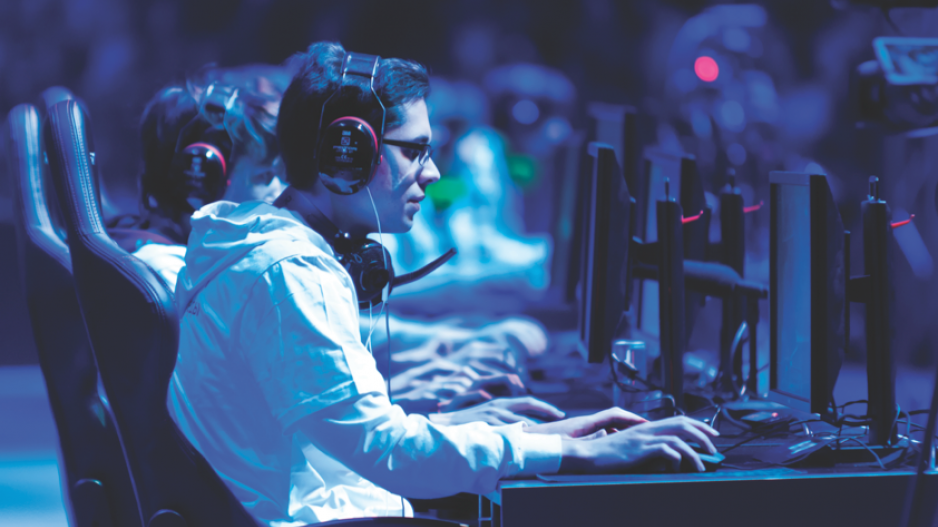There it is, in bold white letters on a black bar, over the top of the shocking-pink Leet.gg website: “Kill your friends and take their money.”
Don’t call 911. Call your investment manager.
The cheeky slogan is on a website that takes Bitcoin payment for multi-player, cash-prize tournaments for video games like Counter-Strike, League of Legends and Minecraft. Last August, Eilers Research published its eSports Betting: It’s Real, and Bigger Than You Think white paper that projected US$250 million in gambling on competitive video gaming in 2015, ballooning to US$23 billion by 2020.
“E-sports and gambling are converging,” University of California, Los Angeles gambling studies Prof. Brett Abarbanel told the BC Lottery Corp.’s (BCLC) New Horizons in Responsible Gambling Conference on February 2.
“These industries are meeting, and they’re absolutely exploding. We have multiple gambling variants, we have multiple gaming variants. We have combinations of crossovers: the gaming components are in the gambling games, the gambling components are in the gaming games.”
Eilers concluded that “e-sports is an extremely hospitable environment [technologically, logistically, culturally and demographically] for real-money online wagering.”
Betting by the gamer community and growth of betting on e-sports “is beginning to benefit from tailwinds generated by positive macro trends for both e-sports and the broader online gambling industry.”
Indeed, the bandwagon is filling up, as video game players emerge from basements to become stars online, at stadium stages and on traditional broadcast networks.
In January, Activision Blizzard (Nasdaq:ATVI) bought Major League Gaming for US$46 million.
The company’s senior vice-president, Mike Sepso, told Wired that the mandate was to “build the ESPN of e-sports.”
ESPN added e-sports news and scores to its website last year. Seattle e-sports startup Unikrn has attracted investment from the Dallas Mavericks’ billionaire owner Mark Cuban and actor Ashton Kutcher.
Abarbanel said e-sports bears all the hallmarks of traditional major sports leagues, with ticket sales, event organization, commentary, merchandising and media sales.
“The core of it is all about entertainment generated by spectating a competition.”
It is biggest in the United States and China, but South Korea and Canada are also hotbeds. E-sports gambling is in a grey area, an unregulated product that is a game of skill, yet some of the players on which wagers are placed are only “tweens.”
The top players in the sport are gaining profile. Vancouver 22-year-old Kurtis “Aui_2000” Ling helped the Evil Geniuses team win the $6.6 million International Dota 2 Championships last summer in Seattle.
Evil Geniuses also are the odds-on favourite at the February 24 Dota 2 Shanghai Major, according to BCLC’s e-sports page on PlayNow.com. The Crown corporation reported $109.1 million in e-gaming revenue in 2014-15, but did not break down the segments.
“These professional teams will live together in one house, and they won’t do anything except eat, sleep and practise,” Abarbanel said.
“They are actively training much in the same way that a traditional athlete has to train his muscle memory.”
Not surprisingly, they use special equipment to improve their posture and circulation, because the sport requires such intense concentration and sitting for long periods. In a data-driven atmosphere, players are rated by efficient actions per minute. It’s not just how fast they can click, she said, “but how fast you can click usefully.”
Abarbanel added that the sport is also facing growing pains that range from allegations of performance-enhancing drug use to match fixing. There is no single global governing organization for e-sports, and the gambling component leaves it open to potential addiction.
E-sports will be coming to a theatre near you. Cineplex (TSX:CGX) announced the US$10 million purchase of WorldGaming last September and said it planned to invest US$5 million to create a competitive gaming league. That came on the heels of last August’s live showing of the ESL One Cologne 2015 Counter-Strike: GO Tournament.
E-sports is exploding among millennials who are entering campus tournaments. University of British Columbia and Simon Fraser University teams went head-to-head in January on a tournament that was webcast live by Twitch.tv, the Amazon-owned website that shows matches around the clock and allows participants to trash-talk each other in real time. •




